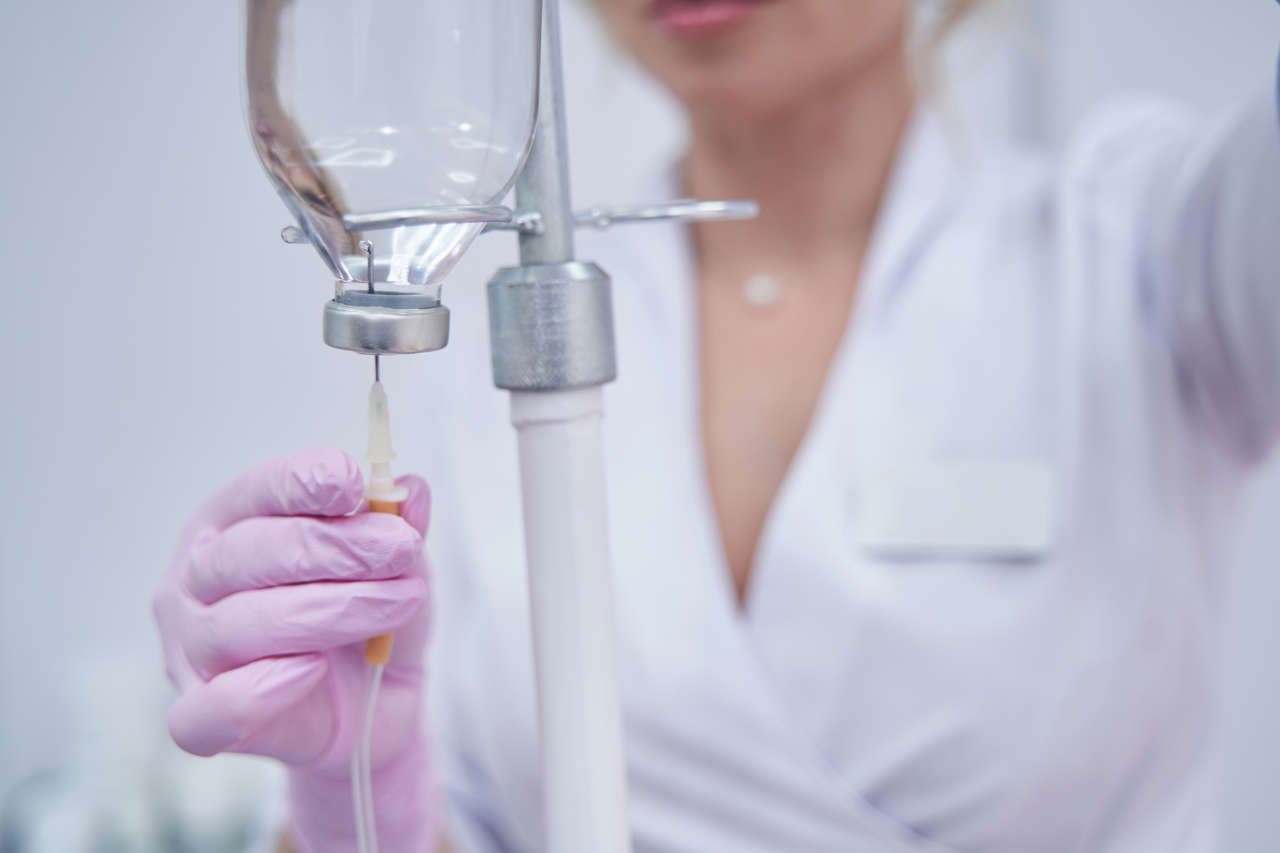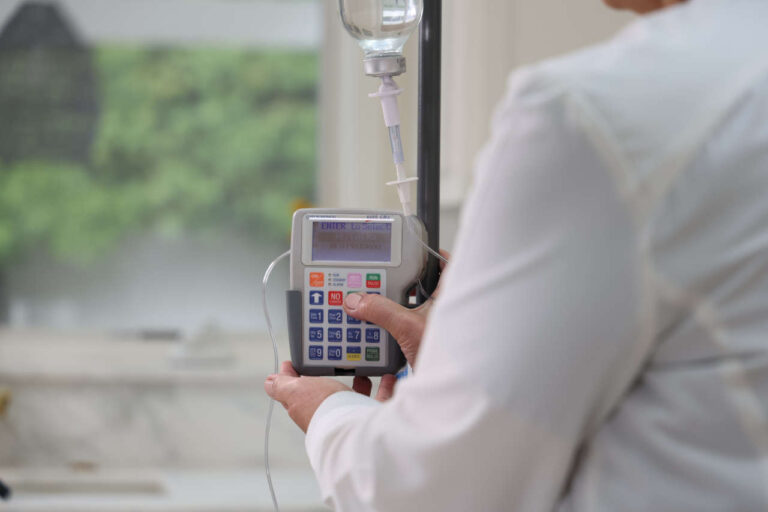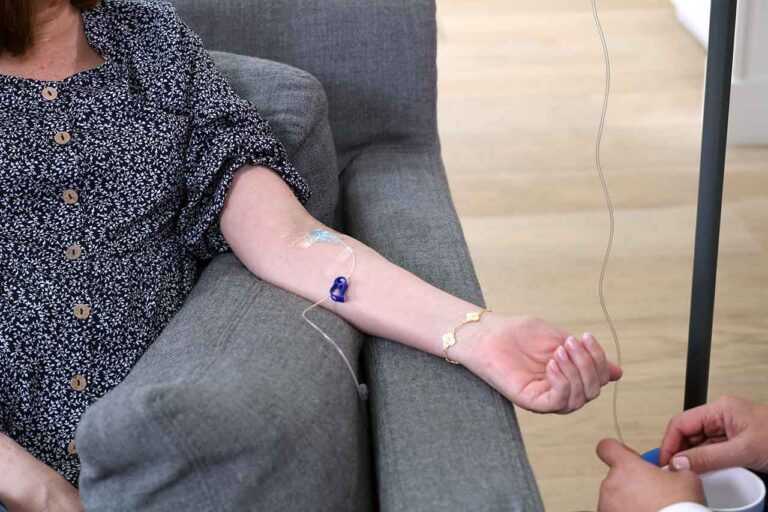
الغلوبولين المناعي الوريدي (IVIG) and plasmapheresis are both therapeutic approaches for treating autoimmune disorders.
احصل على مساعدة الدفع المشترك لـ IVIG
المساعدة المالية IVIGIVIG is a blood-derived product that consists of an antibodies solution. It is prepared from the serum of thousands of donors. This drug is administered at a dose of 200 – 400 mg/kg body weight over 5 days (or as a physician suggests).
Conversely, plasmapheresis involves a procedure wherein blood plasma is extracted from the body and subsequently replaced with suitable fluids. This treatment has garnered recognition for its effectiveness in managing autoimmune disorders, neurological conditions, and various other ailments.
In this article, we explore both IVIG and plasmapheresis in-depth and conduct a comparative analysis, illuminating their respective roles in the management of various medical disorders. This comprehensive article will be of great help to healthcare professionals and patients looking for a deeper understanding of these therapies.
IVIG: Mechanism and Uses
Intravenous immunoglobulin (IVIG) is a critical and highly specialized therapeutic technique for treating a wide spectrum of immunodeficiency illnesses and medical issues. This medication, which is derived from pooled antibodies received from healthy donors, interacts intricately with multiple immune system components.
آلية العمل
IVIG boosts the body’s immunological response by increasing antibody production, allowing it to more effectively combat infections. Furthermore, it controls immune cell receptors, regulates cytokine synthesis, activates the complement system (an essential component of the immune system), and fine-tunes immune cell behavior.
Despite its extensive utilization, there is still a pressing need for a more comprehensive understanding of the precise mechanisms underlying the efficacy of IVIG. Its effectiveness can fluctuate depending on the particular ailment being addressed and the dosage administered.
Use of IVIG
In many inflammatory and immune-mediated diseases, antibody deficits are treated well with IVIG therapy. Many medical ailments are alleviated through IVIG.
These include autoimmune disorders like:
- Guillain-Barré syndrome (GBS)
- Chronic inflammatory demyelinating polyneuropathy (CIDP)
- Myasthenia gravis (MG)
- Multifocal motor neuropathy (MMN)
- Dermatomyositis (DM)
- Polymyositis (PM)
- الذئبة الحمامية الجهازية (SLE)
- التهاب المفاصل الروماتويدي (RA)
- Scleroderma
- Vasculitis
- Immunodeficiencies such as primary immunodeficiency diseases (PIDDs)
Advantages of IVIG
IVIG therapy offers potential benefits such as:
- Reducing the severity and frequency of infections in individuals with immunodeficiencies.
- Easing inflammation in autoimmune diseases.
- Enhancing muscle strength in patients with myasthenia gravis
It is crucial to understand the restrictions related to IVIG therapy, though. They include the high expense of the treatment and the potential for adverse effects like headaches, fever, chills, nausea, vomiting, low blood pressure, allergic reactions, blood clots, or renal damage.
اسأل عن التسريب المنزلي IVIG
Plasmapheresis: Mechanism and Uses
A vital medical technique, plasmapheresis, often referred to as plasma exchange or apheresis, is used to treat a variety of medical disorders. This therapy’s primary objective is to address underlying problems by extracting the blood’s plasma and replacing it with healthy plasma or an appropriate substitute.
آلية العمل
Plasmapheresis works by removing harmful antibodies from the body. Monoclonal paraproteins, pathogenic autoantibodies, immunological complexes, and cryoglobulins are some examples of these defective antibodies. This process aids in the removal of these harmful antibodies, albeit the precise mechanism is not yet entirely known.
Uses of Plasmapheresis
Plasmapheresis is utilized in a wide range of medical conditions, particularly in managing autoimmune diseases.
Some examples of these diseases are:
- Myasthenia gravis (MG)
- Guillain-Barré syndrome (GBS)
- Chronic inflammatory demyelinating polyneuropathy (CIDP)
- Goodpasture syndrome
Furthermore, plasmapheresis effectively treats neurological disorders such as multiple sclerosis (MS) and chronic fatigue syndrome (CFS). It is also used for hematological conditions like thrombotic thrombocytopenic purpura (TTP) and hemolytic uremic syndrome (HUS).
Advantages of Plasmapheresis
Plasmapheresis offers several notable advantages. Some of them are given below:
- Swift elimination of harmful substances from the bloodstream
- Reduction of inflammation associated with autoimmune diseases
- Potential improvement of neurological symptoms in certain neurological disorders
Comparison of IVIG vs. Plasmapheresis

Plasmapheresis and intravenous immunoglobulin (IVIG) are powerful therapies for treating various medical conditions. However, the effectiveness of IVIG vs. plasmapheresis depends on the specific condition being treated. Plasmapheresis is more effective at removing alloantibodies compared to IVIG.
Infections and allergic reactions are a couple of potential side effects of both treatments. However, IVIG generally has a better safety profile compared to plasmapheresis.
There are many things that must be considered before deciding on IVIG vs. plasmapheresis, including patient characteristics, disease severity, and therapy goals.
Here is a quick table that differentiates both treatment procedures:
| الغلوبولين المناعي الوريدي | Plasmapheresis | |
| Composition | Concentrated antibodies derived from multiple donors | Removal of patient’s plasma and replacement with a substitute solution |
| آلية العمل | Provides passive immunity boost by infusing antibodies | Directly removes disease-associated antibodies and harmful factors from the bloodstream |
| Treatment Speed | Requires a longer duration for administration | Can achieve rapid removal of pathogenic factors |
| Indications | Autoimmune disorders, immunodeficiencies, and other immune-mediated diseases | Autoimmune diseases and neurological disorders |
| Potential Risks | Adverse reactions, high cost | Vascular access complications, which require frequent treatments |
Treatment Info
احصل على موافقة مسبقة لـ IVIGCase Studies and Research Findings
Neurological conditions and autoimmune diseases can both be successfully treated with IVIG and plasmapheresis. Their efficiency in various situations has been compared in numerous research.
A study found that IVIG was more effective in managing chronic inflammatory demyelinating polyneuropathy (CIDP) than plasmapheresis. Another study discovered that plasmapheresis was more effective than IVIG in treating Guillain-Barré syndrome.
Furthermore, the positive outcomes of case studies have increased the value of both IVIG and plasmapheresis. A case study demonstrated the effectiveness of IVIG in the treatment of autoimmune hemolytic anemia. Another case report, on the other hand, demonstrated the efficiency of plasmapheresis in treating thrombotic thrombocytopenic purpura. These examples demonstrate the treatments’ concrete effects and possible applicability in real-world clinical settings.
Thanks to IVIG and plasmapheresis, healthcare professionals and patients have promising therapeutic alternatives for navigating the difficulties of autoimmune diseases and neurological disorders.
Which Treatment Option Is More Suitable? IVIG vs. Plasmapheresis?
IVIG (intravenous immunoglobulin) and plasmapheresis are both effective treatments for a variety of illnesses, including autoimmune disorders.
However, selecting the best treatment is dependent on a number of criteria, including the nature of the sickness, safety concerns, and cost considerations. To find the best treatment option for your unique circumstances, contact a healthcare expert.













